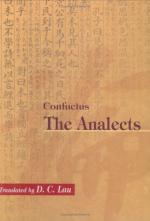|
This section contains 5,253 words (approx. 18 pages at 300 words per page) |

|
SOURCE: Weiming, Tu. “Confucius: The Embodiment of Faith in Humanity.” The World and I 14, no. 11 (November 1999): 292-305.
In the following essay, Weiming identifies what he considers the fundamentals of Confucianism and examines Confucius as a spiritual leader and teacher.
Writing in the 1950s, Karl Jaspers, the German philosopher noted for his idea of the “axial age” civilizations, chose Socrates, Buddha, Confucius, and Jesus as the most significant shapers of the human form of life.1 In supporting his claim, he offered the following justification:
These four paradigmatic individuals have exerted a historical influence of incomparable scope and depth. Other men of great stature may have been equally important for smaller groups, but when it comes to broad, enduring influence over many hundreds of years, they are so far above all others that they must be singled out if we are to form a clear view of the world's history...
|
This section contains 5,253 words (approx. 18 pages at 300 words per page) |

|


